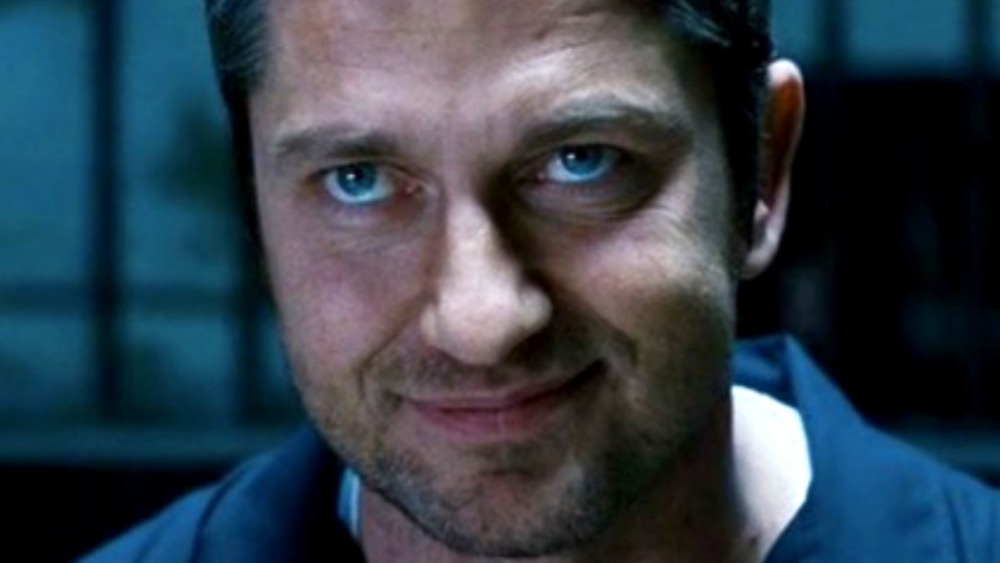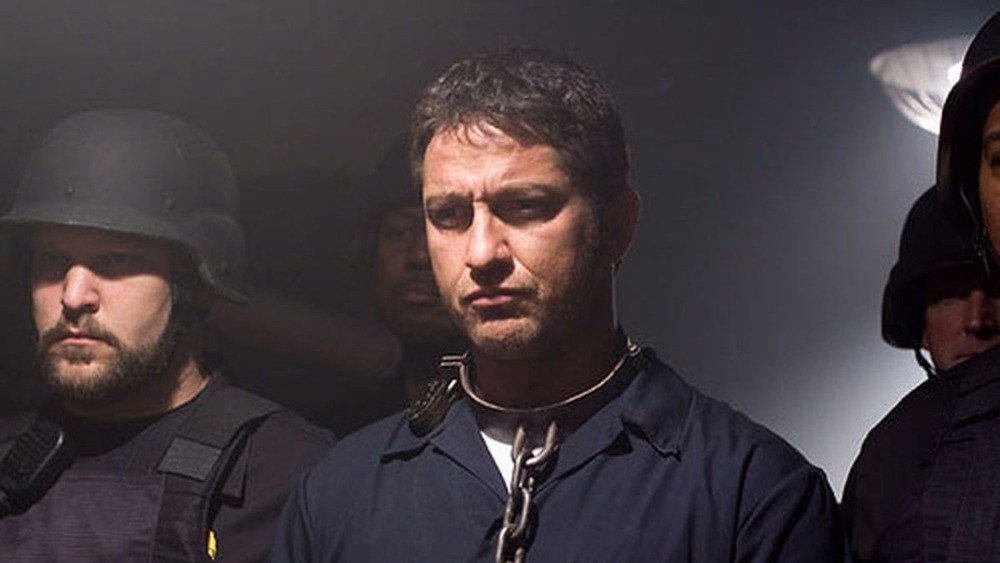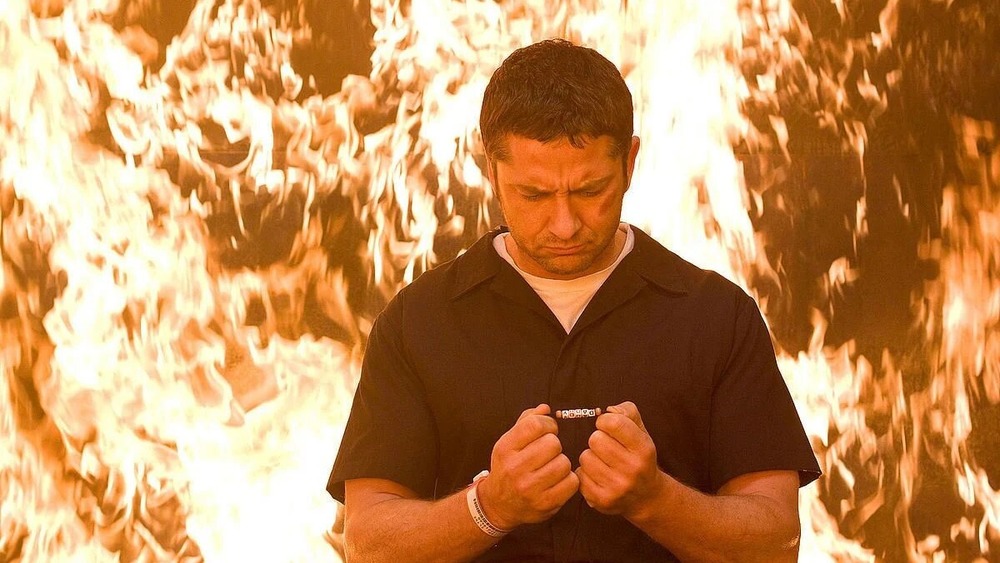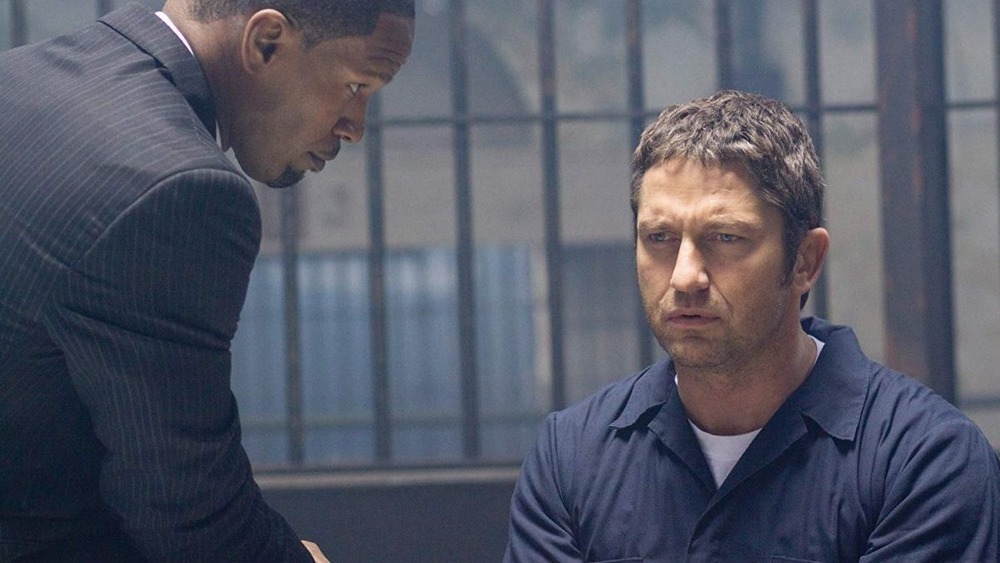The Ending Of Law Abiding Citizen Explained
Vigilante movies have a tendency to revolve around antiheroes who have lost their families or been wronged by the system. Michael Winner's Death Wish provided the template for films of this ilk back in 1974, and most of them have adhered to a similar format since then. Law Abiding Citizen doesn't stray too far from the tried-and-tested formula, but F. Gary Gray's thriller also takes some detours into gross-out horror territory, reminiscent of the Saw franchise and The Silence of the Lambs.
Law Abiding Citizen stars Gerard Butler as Clyde Shelton, a man who loses everything and goes on the rampage after the system fails to adequately punish his family's killers. However, what makes this particular vigilante unique is that he's in jail and able to slaughter his targets from a prison cell thanks to some elaborate underground tunnels. Jamie Foxx plays Nick Rice, an attorney who finds himself tangled up in Clyde's elaborate game of revenge after the deal he offered as prosecutor allowed the killers a lighter sentence for killing Clyde's family. This all leads to a shocking and violent climax, but what makes the ending so interesting?
Law Abiding Citizen exposes the failure of the justice system
As with many vigilante movies, Law Abiding Citizen posits the argument that there are flaws in the justice system. Clyde isn't only interested in punishing the killers who ruined his life; he wants to destroy those who enabled them to walk free in the first place. Clyde's final mission sees him trying to blow up City Hall after the mayor calls an emergency meeting, with all of the judicial figures, while they're all in one place, but Nick is around to thwart his plans. While Clyde's plan ultimately comes back to bite him in the end, it's clear that he was motivated beyond simply killing some politicians and criminals. He wanted Nick to learn a simple lesson: don't make deals with murderers. Essentially, Clyde became a ruthless killer just so that he could change the attorney's worldview, even though that meant him becoming a sacrificial lamb. Then again, Clyde's only purpose for living after his family's death was causing carnage.
On the flip side of the coin, Nick's dealings with Clyde have clearly changed his own outlook. By placing a bomb in his cell, he shows that he's also willing to go to extreme lengths in order to achieve his vision of true justice. Until this point, Law Abiding Citizen is concerned with exploring the ambiguities of the system. However, the ending proposes that capital punishment is the only answer for certain criminals.
Clyde finds peace in death
Despite being violent and explosive, the ending of Law Abiding Citizen is oddly peaceful. When Clyde learns that Nick has placed a bomb in his cell, he's happy about the outcome; while his final smile could have been a reaction to being outsmarted by the attorney, his actions tell a different story. However, his most telling expression comes afterwards, when an aura of peace and calm washes over his body. As the criminal is engulfed by the flames from the explosion, he pulls out a "Daddy" bracelet that his daughter made for him, suggesting that he was looking forward to seeing her in the next life.
It also ends the story on a sympathetic note for the vigilante, as it calls back to a period of his life when he was, as the title states, a law abiding citizen who just wanted to support his family. Though he became a monster following the troubles that befell him, the old Clyde wasn't completely lost.
Law Abiding Citizen almost had a different ending
According to WhatCulture, Law Abiding Citizen went through various iterations before the filmmakers settled on the ending that made the cut. A proposed alternate version would have seen Nick kill Clyde by hand, in turn causing him to get arrested and make a deal with a DA, essentially becoming just like his deceased foe. However, the filmmakers worried that this would have made the character too dislikable and opted against it.
A Reddit thread provided further details on how Law Abiding Citizen could have finished in different hands. Screenwriter Kurt Wimmer reportedly wrote dozens of climaxes, only for notable Hollywood talents such as David Ayer and Frank Darabont to try their hand at writing a satisfying conclusion. Another ending could have featured Clyde strapping a bomb to his chest and threatening Nick's family, resulting in a showdown between the pair that would have seen Nick come out on top.



